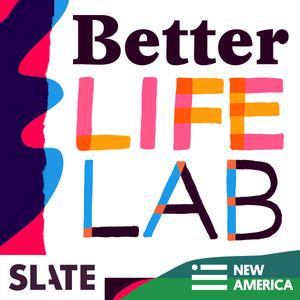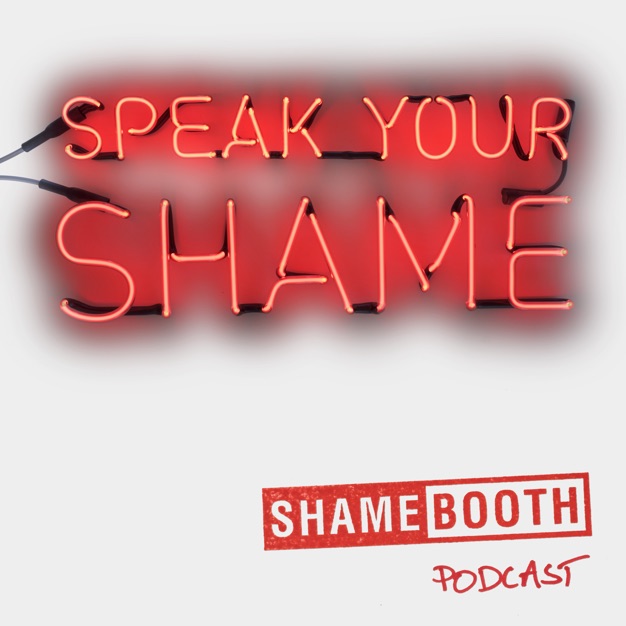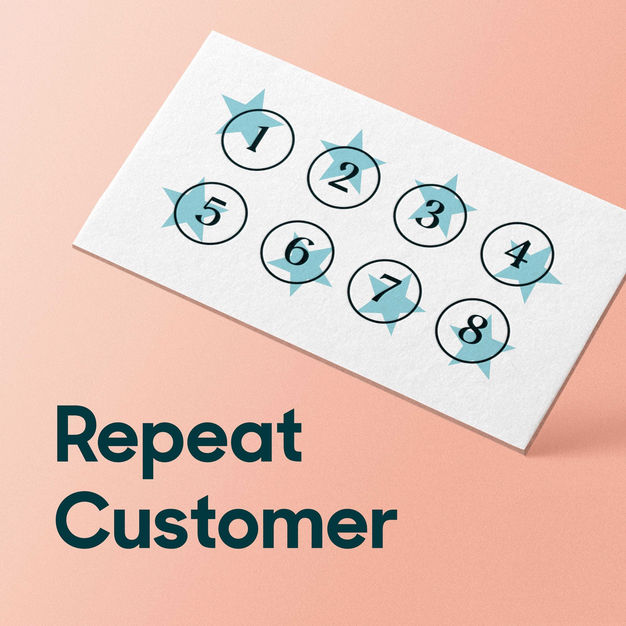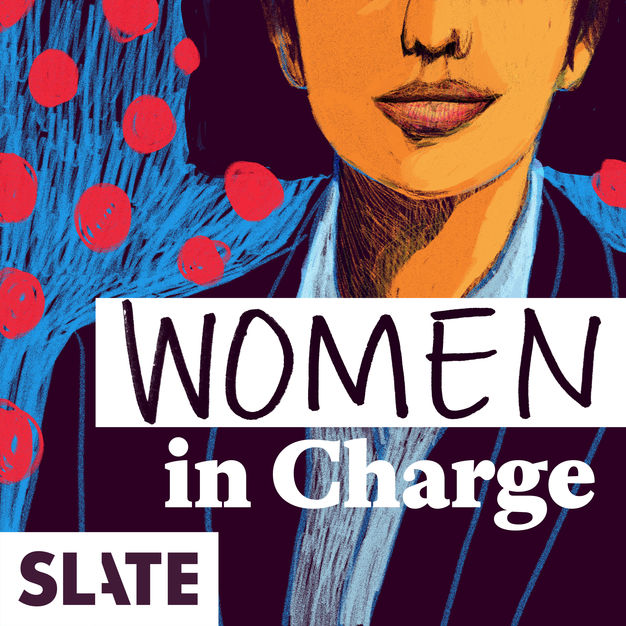
Better Life Lab
New America
Living a full and healthy life.
- 46 minutesThe Future of Wellbeing in an Automated World
This season of Better Life Lab, we’ve been taking a close look at work stress and the future of work and wellbeing.
Parts of the American economy are looking tough for many workers — even “dystopian. People are quitting their jobs at record rates.
We know what many of the problems are. Yet the fixes are not so simple. So on this closing episode of our fourth season, we ask: Are bad jobs an inherent part of the workplace — or can we actually do what it takes to make the jobs of the future good jobs, big enough to support real human life for all of us?
Guests
- Rep. Jim Himes, D-Ct, chair of the House Select Committee on Economic Disparity and Fairness in Growth
- Zeynep Ton, founder, Good Jobs Institute
- Warren Valdmanis, private equity investor and partner with Two Sigma Impact, who will only invest in companies that provide good jobs
Resources
- What if Progress meant Wellbeing for All?, The Metropolitan Group
- Making wellbeing a policy priority. Lessons from the 2021 World Happiness Report, Carol Graham, Brookings, 2021
- The Business Roundtable Redefines the Purpose of a Corporation to Promote an Economy that Serves All, 2019
- Hearing Recap: Our Changing Economy: The Effects of Technological Innovation, Automation and the Future of Work, House Select Committee on Economic Disparity and Fairness in Growth, Nov. 2021
- Economists pin more blame on tech for inequality, New York Times, January 2022
24 May 2022, 11:00 am - 36 minutes 59 secondsThe New Unemployment
Being unemployed in the United States is bad for you.
It’s bad for your mental, physical and emotional health. Bad for your family stability. Bad for your ability to survive.
It’s just bad news, period.
The research shows that 83 percent of laid-off workers develop a serious stress-related condition. And as we look at the future of work, that’s a problem for the American economy. Because one of the big questions about the American workplace is:What if, in the a future, we actually have less work … and more unemployment?
Guests
- Kiarica Shields, hospice nurse in Georgia who lost her job early in the pandemic, and eventually lost her home and her car. Her unemployment insurance stopped inexplicably, and after she her appeal, she was told she was ineligible for coverage because she worked a single day on another job.
- Mark Attico - furloughed at the start of the pandemic in his job planning business travel. Was on unemployment for months, and with the pandemic supplement his income was actually enough to pay his bills, and gave him time to reconnect with his teenage son - and hold out for a better job that fit his skills and paid well.
- Dorian Warren, co-president of Community Change.
- Sarah Damaske, author of The Tolls of Uncertainty: How Privilege and the Guilt Gap Shape Unemployment in America.
Resources
- Reforming Unemployment Insurance: Stabilizing a system in crisis and laying the foundation for equity, A joint project of Center for American Progress, Center for Popular Democracy, Economic Policy Institute, Groundwork Collaborative, National Employment Law Project, National Women’s Law Center, and Washington Center for Equitable Growth, June, 2021
- A Playbook for Improving Unemployment Insurance Delivery, New America New Practice Lab, 2021
- A Plan to Reform the Unemployment Insurance System in the United States, Arindrajit Dube, The Hamilton Project, April 2021
- How Does Employment, or Unemployment, Affect Health, RWJF, 2013
- Single transitions and persistence of unemployment are associated with poor health outcomes, Herber et al, 2019
- The Toll of job loss, Stephanie Pappas, American Psychological Association, 2020
17 May 2022, 11:00 am - 36 minutes 36 secondsIs America Ready for a Guaranteed Basic Income?
Michael Tubbs grew up in poverty. And when, at 26, he was elected mayor of his hometown, he decided to do something about it.
And what he did in Stockton, California, no American mayor had done before. He started giving poor people cash. No strings attached.
Stockton’s pilot program in Guaranteed Basic Income started lifting people out of poverty. It gave parents more time with their kids. And it was actually cost-effective.
So as we look to the Future of Work and Wellbeing, could Guaranteed Basic Income programs play a central role in lifting all of us up — and boosting the standard of life for all Americans?
Guests
- Michael Tubbs, elected mayor of Stockton, California in 2016 at the age of 26 — the youngest mayor in the country. He is known nationally for establishing the first city-led Guaranteed Basic Income program in America, which has inspired dozens of other cities across the country to try similar programs. Having lost his re-election bid in 2020, Tubbs recently founded the nonprofit End Poverty in California.
- Natalie Foster, co-founder, co-director Economic Security Project, which worked closely with Tubbs on Stockton’s Guaranteed Basic Income program
- John Summers, participant in pilot guaranteed basic income program Cambridge RISE in Massachusetts.
Resources
- Stockton’s Basic Income Experiment Paid Off, Annie Lowrey, The Atlantic
- The Potential for a Guaranteed Income: A Conversation with Four Mayors, New America California, 2021.
- The Future of Leisure, Stuart Whatley, Democracy Journal, 2012
- The Evolving Concept of Time for Work, Leisure, Pew Research, 2008
Less Work and More Leisure: Utopian Visions and the Future of Work, CBC Radio, 2018
10 May 2022, 11:00 am - 51 minutes 49 secondsTechnostress
PTSD. Burnout. Depression. That’s what you get from a too stressful workplace. And — employers take note — you also get reduced commitment to work, and much higher costs.
As workplaces have navigated the COVID pandemic, new technologies have amped those stresses to 11. Bossware. Tattleware. After-hours nastiness on Slack. Now there’s a whole different kind of “technostress” wearing on warehouse and retail workers, whose every movement is tracked and rated by algorithms.
Researchers are only beginning to study the impact “technostress” has on workers, from toxic interpersonal relationships to “email apnea” Tech is here to stay — but how can we foster healthier, less “technostress”-inducing work cultures?
Guests
- Roxanne Felig, doctoral student at the University of South Florida, who was cyber bullied online after publishing her first major research paper — and publicizing it on TikTok.
- Adrian Ugalde, retail worker at a big box store in LA
- Maddie Swenson, who quit her remote job as a creative director because of the stress of being monitored with Bossware.
- Ashley Nixon, Associate Professor of Human Resource Management and Organizational Behavior at Willamette University.
Resources
- Workplace Monitoring and Surveillance, Data and Society, 2019
- Technostress Dark Side of Technology in the Workplace: A Scientometric Analysis, Bondanini et al, 2020.
- Technostress: Implications for Adults in the Workplace, Atanasoff & Venable, 2017
- Workplace bullying jeopardizes employees’ life satisfaction: the roles of job anxiety and insomnia, Nauman, Malik & Jalil, 2019
- The Workplace-Surveillance Technology Boom, Natalie Chyi, New America Weekly, 2020
- Are you Breathing? Do you have email apnea? Linda Stone, 2014
3 May 2022, 11:00 am - 38 minutes 52 secondsWorking While Black
The Civil Rights movement opened up new work opportunities for Black workers. But, decades later, African-Americans work disproportionately in low-wage jobs and are overrepresented in the jobs at highest risk of vanishing because of workplace automation.
White workers, meanwhile, are 50 percent more likely to hold “future proof” jobs. These are the kind of jobs that build often on education in Science, Technology, Engineering and Math. And for those Black workers who do find a path to “future proof” jobs in health care or tech, the reward often includes a hostile work environment. And that’s bad news for every American. One study found that eliminating racial inequality could boost the U.S. economy by as much as $2.3 trillion a year. What are we waiting for?
Guests
- LeRon Barton, tech worker, author of two books, and essayist who has written “What It’s Like to be a Black man in Tech” and other pieces for the Harvard Business Review.
- Nahsis Davis, a nurse and union member in Chicago.
- Adia Harvey Wingfield, author of Flatlining: Race, Work and Healthcare in the New Economy, and professor of sociology at Washington University in St. Louis.
Resources
- What it’s Like to be a Black Man in Tech, LeRon Barton, Harvard Business Review, 2021
- Flatlining: Race, Work and Healthcare in the New Economy, Adia Harvey Wingfield.
- No More Invisible Man, Adia Harvey Wingfield.
- Race and the Work of the Future: Advancing Workforce Equity in the United States, PolicyLink, USC Dornsife, burning glass, National Fund for Workforce Solutions
- Why are Employment Rates so Low among Black men? Holzer, 2021
- Digitalization, Automation & Older Black Women: Ensuring Equity in the Future of Work - Chandra Childers, IWPR, 2019
26 April 2022, 11:00 am - 30 minutes 31 secondsSleepless in the Gig Economy
With the advent of the New Deal, employers were expected to guarantee workers a measure of security — a fair wage, a reasonable number of hours, benefits like retirement and health insurance. Recent years have seen a rise in “non-standard” work arrangements — independent contractors and gig workers who work without benefits or job protections. Gig-work platforms offer workers the tantalizing promise of flexibility and freedom.
Gig-work platforms make the tantalizing promise of flexibility and freedom. But that can come at a deceptively steep price for many gig workers: low and variable wages, unpredictable schedules, and paltry benefits. Trying to make a living this way is also enormously stressful —one study of gig workers found that the more employment insecurity they experienced during the day, the more their nights became fitful, sleepless and anxiety-ridden.
Guests
- Cherri Murphy, a pastor and former ride-share driver, now trying to organize workers with Gig Workers Rising.
- Quan D. Mai, an assistant professor of sociology at Rutgers University who has published several articles on the new normal of gig work.
Resources
- After the Gig: How the Sharing Economy got Hijacked, Bergguen Institute’s Future of Capitalism & the Platform Cooperativism Consortium
- A Brief History of the Gig, Veena Dubal, 2020
- The battle for the future of “gig” work, Sarah Jaffe, Vox
- Rideshare Drivers United
- Why Precarious Work Is Bad for Health: Social Marginality as Key Mechanisms in a Multi-National Context, Macmillan, Shanahan, 2021
- Gig Economy in the U.S. – Statistics and Facts
19 April 2022, 11:00 am - 42 minutes 24 secondsWhere Have All the Women Gone?
Recently there’s been a dramatic shift in the American workforce: The “Great Resignation.” “The Big Quit.”
In one year, more than 47 millions of people left their jobs. The majority were women.
“It is horrible for our economy when millions of women exit the labor force,” says economist Michelle Holder, CEO of the Washington Center for Equitable Growth.
While men have regained nearly all the jobs they lost since the start of the COVID-19 pandemic, we’re still missing 2 million women.
So where have all the women gone?
We’ll hear Holder’s insights, as well as the stories of two working women whose thriving careers were turned upside down by the rigidity — and sexism — built into the American workplace.
Guests
- Kari McCracken, a mother from Lexington, Kentucky. She had a job she loved, and managed close to a hundred employees. Then the pandemic hit.
- Kiarica Shields single mother of four in Georgia, lost her job as a hospice nurse in the early days of the pandemic, then with schools and child care closed, has struggled to find the care she needs in order to find work.
- Michelle Holder, economist, CEO Center for Equitable Growth who has been named one of 19 Black economists to watch by Fortune. Author of two books, she recently published an important paper on the impact of COVID-19 on job losses among Black women in America.
Resources for Show notes
- Handling work-family conflicts: future agenda, International Journal of Manpower, 2017
- Work-Family conflict and mental health among female employees, Frontiers in Psychology, 2018
- Measuring work-life conflict among low-wage workers, Nichols & Swanberg, 2018
- The jingle jangle of work-nonwork balance: a comprehensive and meta-analytic review of its meaning and measurement, Casper et al, 2018
- Lower-wage workers and flexible work arrangements, Danziger & Waters Boots, 2008
- When work and families are allies: a theory of work-family enrichment, Greenhaus & Powell, 2006
- Work-family enrichment and satisfaction: the mediating role of self-efficacy and work-life balance, Chan et al, 2015
- “The Early Impact of COVID-19 on Job Losses Among Black Women in the U.S.” Holder 2021
12 April 2022, 11:00 am - 40 minutes 7 secondsCaregiving in America — the Dignity Gap
In the future, robots may take over tasks such as doling out medications. But no machine can raise a child or truly care for a disabled, ill or aging loved one.
And home care jobs are projected to be among the fastest-growing jobs in America. The Bureau of Labor Statistics expects care jobs will grow 33 percent by 2029. By some estimates, 70 percent of people over 65 soon will require long-term care.
But care jobs are also, for the most part, poverty-wage jobs. They are low-paying, stressful, emotionally taxing, unpredictable and precarious. Half of all care workers in America earn so little that they qualify for public benefits. Nine out of 10 home health workers are women, 62 percent are people of color and one-third are immigrants.
In what many scholars say was an overt act of white supremacy and patriarchy, care workers were excluded from the Fair Labor Standards Act of 1938. They were denied the federal right to organize and collectively bargain, demand a minimum wage or overtime pay. What would the future of care work look like if they could?
Guests
- Brittany Williams, home care worker living in Washington state, and a member of a union representing caregivers.
- Danielle Williams, Brittany’s mother, a home care worker in Arkansas. She earns about half of what Brittany does, and few benefits.
- Ai-Jen Poo, Executive Director of the National Domestic Workers Alliance, and a MacArthur “Genius” award winner named among the “World’s 50 Greatest Leaders” by Fortune.
Resources
- Working while Caring: A National Survey of Caregiver Stress in the U.S. Workforce, Rosalynn Carter Institute for Caregivers
- Mother and Daughter do the same job. Why does one make $9 more an hour?, Brigid Schulte & Cassandra Robertson
- Professional Caregiving men find meaning and price in their work, but still face stigma, Brigid Schulte, Emily Hallgren, Roselyn Miller
5 April 2022, 11:00 am - 37 minutes 25 secondsAmerican Karoshi — the Problem with Work Stress
In Japan, generations of workers have given their all to the code of Karoshi. It’s a word that literally means, “Work til you die."
Few Americans know the word “Karoshi.” We don’t think it happens here. But the workplace now actually ranks as the fifth leading cause of death in America.
To help us understand work stress better, we’re joined by the co-directors of the Healthy Work Campaign. Marnie Dobson and Peter Schnall. How do we shift from work being something that can make your life miserable, to something that can enhance the quality of your life? It comes down to how much power, control and autonomy you have at work.
Guests:
- Cate Lindemann, a lawyer in Illinois who suffered a stress-induced heart attack
- Cherri Murphy, a pastor and former Lyft driver in California
- Marnie Dobson and Peter Schnall, co-directors of the Healthy Work Campaign
Resources:
- The Relationship Between Workplace Stressors and Mortality and Health Costs in the United States, Joel Goh, Jeffrey Pfeffer, Stefanos A. Zenios
- Global, regional, and national burdens of ischemic heart disease and stroke attributable to exposure to long working hours for 194 countries, 2000–2016: A systematic analysis from the WHO/ILO Joint Estimates of the Work-related Burden of Disease and Injury, Pega et al, May 2021
- Bad Jobs, Bad Health? How Work and Working Conditions Contribute to Health Disparities Burgard & Yin 2013
- Psychosocial Factors at Work: Recognition and Control, a report of the Joint International Labour Office and World Health Organization Committee on Occupational Health (1985)
- Employee Control and Occupational Stress, Paul Spector, 2002 “Evidence is growing that enhanced control at work can be an important element in employees' health and well–being.”
- Healthy Work Campaign fact sheet
- Work, Stress and Health and Socio-Economic Status, American Psychological Association
- Workplace Stress, ILO, 2016
29 March 2022, 11:00 am - 38 minutes 45 secondsRage Against the Machine
As much as the media has been inundated with future of work stories that read like a Sci-Fi-like robot apocalypse, the future of work, in a very real sense, is already here. And what’s really at stake is inequality.
The real question for the future of work is not whether automation, robots and AI will replace jobs - they will. And, if history is any guide, as-yet unimaginable jobs will be created. Over 60 percent of the jobs today didn’t exist in 1940, according to MIT researchers. The real question is - will the jobs that are created be “big enough” for workers and families to thrive, much less survive.
And, given the current trajectory we’re on, the answer is no.
Since the 1980s, automation, globalization, the financialization of the U.S. economy and policies that rewarded capital instead of labor have led to a sharp polarization of the U.S. workforce. Middle class jobs lost have been replaced by increasingly unstable, precarious jobs - involuntary part-time, low-wages, with scant access to benefits like health care, and unpredictable schedules.
But, as economist David Autor and his colleagues at MIT argue, that polarization is a choice. And we could come together as a society and make a different choice for the future. If we don’t, he warns, we are building toward a stratified society of “the servers and the served.”
Guests
- Joe Liebman, warehouse picker in St. Louis making $17.50/ hour. Lost his white collar job in the 2008 Great Recession - and his house, his family, his sense of wellbeing.
- David Autor, economist, MIT, co-chair of the MIT Task Force on the Work of the Future.
Resources:
- MIT Future of Work Task Force
- Future of Work Initiative, Aspen Institute
- Extending the Race Between Education and Technology, Autor, Goldin, Katz, 2020
- The Future of Warehouse Work, UC Berkeley Labor Center
- Worker Voices: Technology and the Future for Workers, Molly Kinder, Amanda Lenhart, New America, 2019
- The Future of work and its impact on Health, Blue Shield of California Foundation and the Institute for the Future, 2020
- The Future of Jobs Report 2020, World Economic Forum (Automation projected to eliminate about 85 million jobs in the next five years—potentially displacing up to half of the United States workforce with no clear path for them to connect to the new jobs likely to be created by these technological changes)
- BLS fastest growing occupations 2020-2030
22 March 2022, 11:00 am - 25 minutes 40 secondsCrisis Conversations: Essential stories — and essential lessons — from a year in crisis
In this year-end edition of Crisis Conversations, Brigid and members of the Better Life Lab team reflect on the memorable stories, voices, and lessons learned from COVID-19. And we consider a bold new agenda for work-family justice and gender equity in 2021 and beyond.
Host:
Brigid Schulte, Director, Better Life Lab at New America
Guests:
Vicki Shabo, Senior Fellow, Paid Leave Policy and Strategy at Better Life Lab
Roselyn Miller, Policy Analyst, Better Life Lab
Jahdziah St. Julien, Research Associate, Better Life Lab
Emily Hallgren, PhD BLLx Intern, Better Life Lab
Stavroula Pabst, PhD Intern, Better Life Lab
12 December 2020, 12:00 pm - More Episodes? Get the App
Your feedback is valuable to us. Should you encounter any bugs, glitches, lack of functionality or other problems, please email us on [email protected] or join Moon.FM Telegram Group where you can talk directly to the dev team who are happy to answer any queries.
 The Leap
The Leap
 SHAMEBOOTH Podcast
SHAMEBOOTH Podcast
 But That's Another Story
But That's Another Story
 Repeat Customer
Repeat Customer
 Medium Playback
Medium Playback
 Women in Charge
Women in Charge